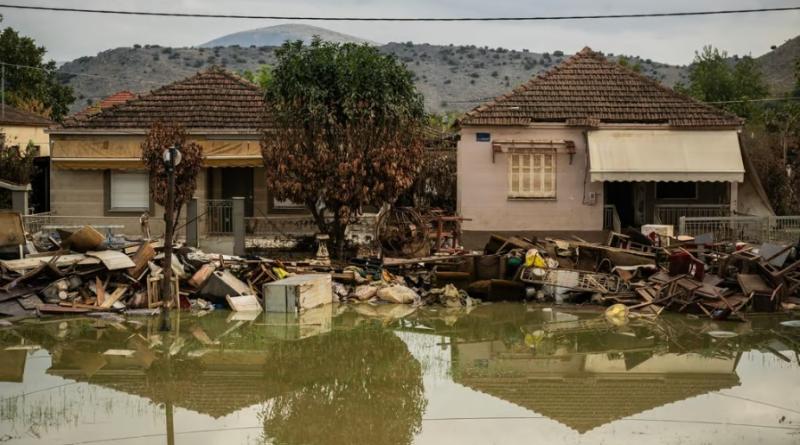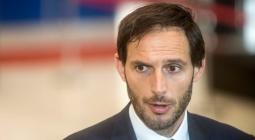US-EU unity ruptures over climate damage payments

The dispute has often pitted rich, heavy-emitting countries like the U.S. and the EU against the developing countries facing the impacts of those emissions. But long-simmering differences between Brussels and Washington are now also bubbling over as the new fund takes shape — especially as calls mount for wealthy countries to pay up.
In Abu Dhabi, Germany’s lead negotiator went out of her way to clarify that even though she was speaking for a group of developed countries, “our constituency is not one single group with one single voice.”
That transatlantic divide risks complicating rich countries' efforts to get developing nations to sign up for more ambitious climate action at the COP28 climate summit starting later this month in Dubai. Cracks in the EU-U.S. alliance will make negotiating against the likes of China and Saudi Arabia trickier, and Washington’s reluctance to pay is impeding efforts to build trust between the poorest and most vulnerable nations and those with the resources to help them.
U.S. climate envoy John Kerry told an event on Friday he was “confident” that Washington would contribute “several millions,” though it’s unclear when it could be delivered. The Biden administration has struggled to get finance for international climate efforts through Congress and tends to take a more hardline stance on climate disaster funding — for both strategic and ideological reasons.
The EU is no longer waiting around.
“We, the EU, are not only prepared to lead, but we are capable of showing leadership,” a senior EU diplomat, granted anonymity to speak candidly about the matter, told POLITICO.
Differing philosophies
The divide stems partly from a different sense of the moral responsibility borne by the U.S. and EU.
As the climate talks earlier this month concluded in Abu Dhabi, European representatives reluctantly supported the framework, while the U.S. continued to press for changes even after the meeting had ended, claiming the adopted text was “not a consensus document.”

A State Department official told POLITICO the U.S. “did not consider it sufficiently clear what the members were being asked to agree to, particularly on the issue of sources of funding.” The text has now been clarified, the official added, putting the U.S. in a position to welcome the negotiators’ recommendations.
“So I hope we're going to avoid an implosion in Dubai because we now have agreed … on the way in which we can manage this fund,” Kerry said on Friday.
But the tiff over punctuation — the Americans were largely concerned about the placement of a comma they argued could indicate developed countries had a particular responsibility to pay — is another sign of the divergence between Washington and Brussels.
The EU and the U.S. are aligned on core issues: Both want a fund for vulnerable countries that doesn’t pin a unique responsibility on developed countries to provide the cash.
But Europe has been more comfortable with a document calling on wealthy nations to take the lead on money. “These distinctions can cut in both directions — if we're taking the lead, then we're expecting someone else to follow,” the EU diplomat said.
The EU’s more relaxed approach stands in contrast to Washington’s obsession with legally watertight language. The U.S. worries that any suggestion that rich polluting nations might have a responsibility toward countries hit by climate disasters could lead to legal obligations to pay compensation.
“As always, the European team is more flexible, and they’re the first who are ready to invest,” said Gayane Gabrielyan, Armenia’s deputy environment minister, who participated in the Abu Dhabi talks.
America’s political trump card
Cash-strapped countries argue such financial pledges are the incentive they need to make their own emissions-slashing commitments.
“You can't ask developing countries to have a faster, greater green transformation than any developed country ever did and then on the other side say, ‘Oh, well we feel no obligation, and feel no responsibility for their climate loss and damage,’” said Avinash Persaud, climate envoy of Barbados, who participated in the talks in Abu Dhabi.
“I think the Europeans get that but our American partners don't always appear to — or local politics trumps that,” he added.
Those politics are quite tricky for the U.S., however. President Joe Biden must get international climate finance pledges through Congress — a momentous challenge given the Republican-controlled House and a slim Democratic majority in the Senate, not to mention a potential looming government shutdown that would stall all funding bills.
Officials bring that challenge with them into climate finance negotiations, observers say.

“They try to create funds or agreements that are going to be more palatable in Congress,” said Brandon Wu, director of policy and campaigns at ActionAid USA. “But historically, the results of that has been the U.S. has just consistently watered stuff down and has not been a reliable partner in joining agreements or contributing funds.”
That’s true for all kinds of climate funding, not just loss and damage. When Germany hosted a replenishment conference of the U.N.’s Green Climate Fund last month, Berlin put forward a record €2 billion, with other EU countries also contributing. The U.S. pledged nothing.
In another interview on Friday in Singapore, Kerry promised that Washington would “make a good-faith effort” when it comes to helping victims of climate disasters.
“But we need everyone to take part — it can’t be just a few countries, we need everyone to help to the degree that they can,” he said.
Leading or ceding leverage?
Some see the Europeans’ flexibility as a strategic mistake.
A former U.K. official, granted anonymity in order to discuss a sensitive diplomatic matter, said that at last year’s COP27 in Egypt, the European Commission team undermined the position of other wealthy countries by backing a climate disaster fund before developing countries had agreed to cut emissions in return.
The EU appears to have taken that message on board this year, with Hoekstra strongly implying Brussels will use climate disaster funding as a bargaining chip to obtain emission-cutting concessions.
If countries make enough pledges at COP28 to slash emissions, the new climate disaster fund “can be launched in Dubai, with the first pledges, too,” he said in a speech in Kenya last week. “Because if we don't cut greenhouse gas emissions, no amount of money will be able to pay [for] the damages.”
But the EU is already gathering money. A senior European climate negotiator, who could only speak on condition of anonymity because of their sensitive position, said Hoekstra had been touring European capitals asking them to prepare contributions, something the Commission would not confirm but did not deny.
No official POLITICO spoke to would say on the record whether and how much their country would pay into the fund — except for Denmark’s climate minister Dan Jørgensen.
“We were the first country to pledge money last year ... and we will also be ready to do that again now,” Jørgensen told POLITICO and four European newspapers last week, promising a “generous pledge.”
Asked for more details later, his office asked POLITICO not to publish the comment — implying that the minister should not have revealed Denmark's intention to pay just yet.
Still, the EU let the cat out of the bag on Monday with its promise to pay into the fund, even as it declined to detail how much. The precise amount, a diplomat from a European country represented at the recent loss and damage talks, was the “big fat carrot” in the COP28 negotiations.
But asked if Brussels was also bringing a stick to Dubai, the diplomat conceded: “I think the Americans are the ones swinging a stick.”
Abby Wallace contributed reporting.





